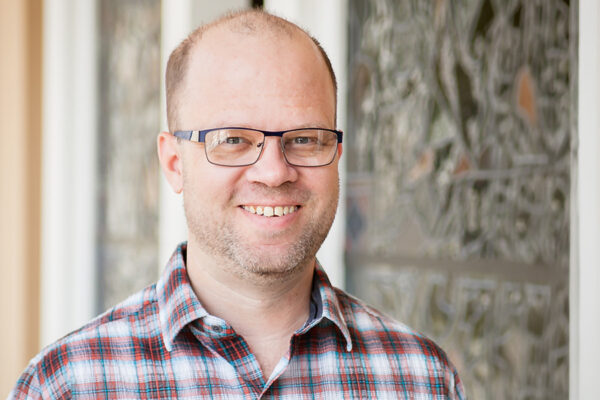St. Paul members Mike and Amy Paustian view themselves as caretakers of the family farmland, caring for the soil and creating opportunities for future generations of farmers.
Turning in just past the big blue diesel tank of the world’s largest truck stop, around twisty turns and gravel roads, the Paustian Family Farm has sat on this stretch of land for nearly 170 years, since Mike Paustian’s great-great-great-grandfather arrived from Germany in 1856. While the homestead land was only 160 acres back then, the property in Walcott, Iowa has grown to 2,400 acres of farmland today.
The farm is home to corn, soybeans, and a 1,200-sow farrow-to-finish hog operation. 660 pigs are born on the farm every week and 14 employees keep it all functioning, seven of which are family. Mike’s parents, St. Paul members Kent and Marcia Paustian are still active on the farm, with Mike’s uncle and cousin. A new generation is stepping in to take over the mantle, carrying forth what they have learned from their parents and continuing to move farming into the future.
Mike and Amy Paustian are two of these next-generation farmers. The couple met as students at Iowa State University, both studying microbiology. Amy grew up in the southwestern corner of Minnesota on a hog farm like Mike. Mike, now with a Ph.D. in microbiology, was working with the National Animal Disease Center in Ames, and Amy was testing animal ingredients when they decided to move to the Quad Cities and farm alongside family.
The Paustian kids, Zachary (19), Elizabeth (17), and Madeline (14), are a big reason Mike and Amy decided to come back to the family farm. Zachary, now a freshman at Iowa State University studying agriculture engineering, was about to start kindergarten and the Paustians knew it was now or much later.
“We had the conversation when our oldest was about to start kindergarten. Do we want our kids to grow up on a farm like we did? If so, we had to do it before he started school,” Amy said. “That was the big discussion. It wasn’t an easy decision but we’re both happy we did it.”
Stewards of the land
The farm has grown through the generations as many have cared for it, experiencing both good and tough times, and Mike and Amy see their roles as caretakers of the land.
“We’re just the current stewards of the farm. A lot of people did a lot of work to give us the opportunity to farm here so now it’s our turn to steward it and ensure it’s in better shape for future generations. It’s almost impossible for someone who isn’t in farming to get into farming anymore. That’s why we feel strongly about being caretakers now. If future generations want to farm, this is going to be their only chance. We want to leave the farm in good shape, so they have that opportunity like we had that opportunity.”
Future generations
Sustainability is a focus for the Paustian family. Utilizing environmentally friendly techniques such as no-tillage and the planting of cover crops, they’re able to increase organic matter within the soil, helping to keep it full of nutrients. And even the pigs are part of the process; the corn feeds the pigs and the pigs feed the corn, fertilizing the next crop with their manure thus creating a cycle of resources.
“I’m a big believer in being a life-long learner. We’re trying to make our farm resilient so we can weather the ups and downs. Utilizing no-tillage and cover crop is a big part of that,” Mike said. “We put solar panels on parts of the farm to minimize our environmental impact and that’s becoming increasingly important. We’re going to need to produce more using fewer resources so we’re trying to position our farm to be able to do that.”
This August, the Paustian Farm was awarded The Iowa Farm Environmental Leaders award. The award recognizes farmers who “improve or protect the environment and the state’s natural resources.”
Future of farming
Technology moves the Paustian farm forward. Automation is increasingly important. Climate-controlled barns, automatic feeders, autonomous tractors, and even drones allow for more to be done.
“Agriculture struggles with a lack of understanding of what we do and why we do it. Someone pointed out to me that the 1950s-era bib overall wearing farmer has been enshrined in our culture and that’s often people’s starting idea of farming,” Mike said. “When someone gets a glimpse of modern farming, it’s shocking.”
“Recently, we were drone flying cover crop over the crops and Kent said, ‘What would Grandpa think of this?’ Amy recalled. “This is nuts. We’re flying this drone that’s dropping seed.”
Vast changes in technology have changed farming over the past 75 years.
“In my grandfather’s lifetime, he went from farming with horses to GPS tractors that steer themselves and we’re continuing forward from there,” Mike said. “A lot of people think of farmers as being old-fashioned, but most farmers are tech-savvy and open to utilizing recent technologies. We’re always looking for new ways to do things.”
Will the Paustian kids one day return to the farm, new technology in hand, to carry the torch into the next generation? That’s up to them.
“Our job is to make sure it’s an option, not a requirement. My parents never put any pressure on us to work at the farm and we’ll do the same with our kids,” Mike said. “They need to spend some time away from the farm to appreciate it to gain perspective, like I did. It would’ve been different for us if we felt obligated to return. We were able to do our own thing and make that decision for ourselves when the time was right.”




